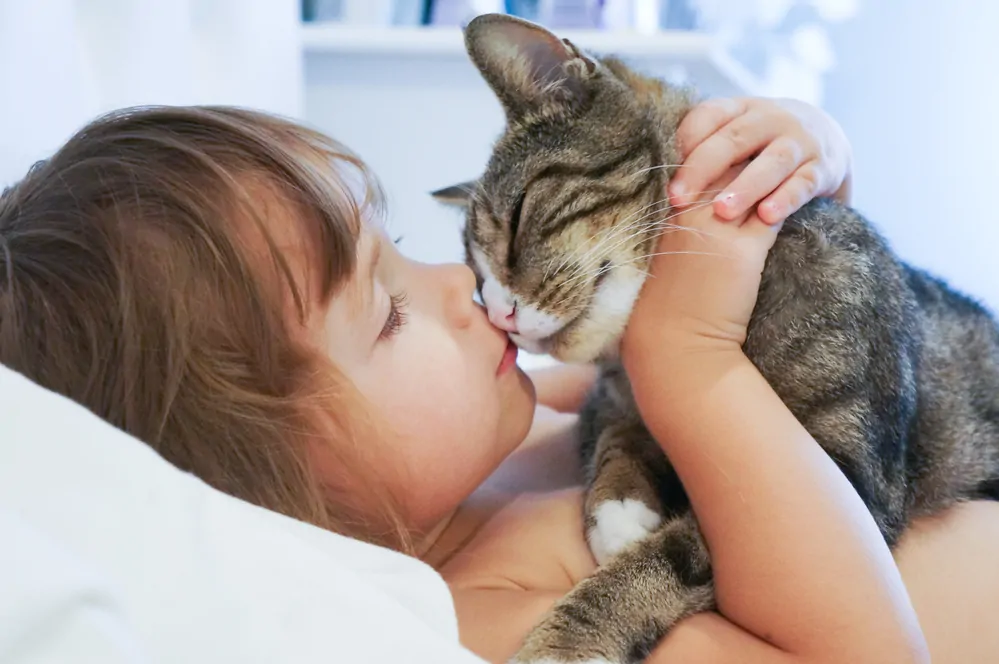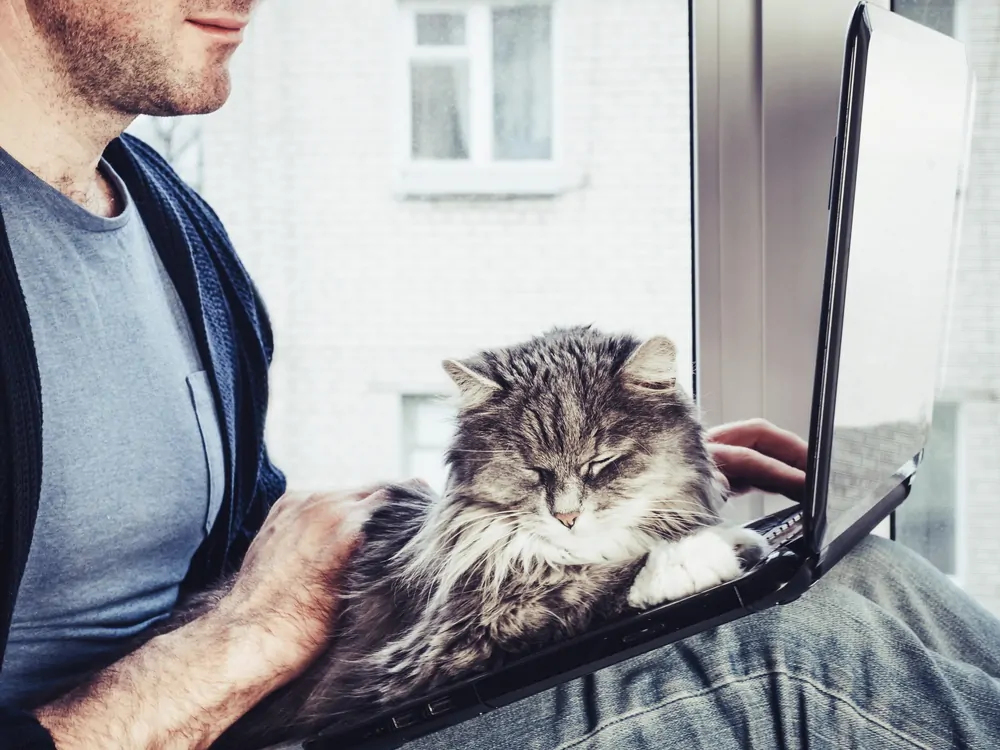“Are cats haram in Islam? Cats are not haram in Islam. They are considered clean animals, often cherished and kept as pets, aligning with Islamic teachings that advocate kindness and care for animals.
Dive into why cats hold such a special place in Muslim hearts and homes, and discover the intriguing blend of faith, affection, and respect for these graceful creatures.”
The Islamic Perspective on Cats

Cats in Islamic Teachings
Islam is a religion that preaches compassion and mercy, not just towards fellow humans but all of God’s creations.
Cats, in the realm of Islam, are revered creatures that are admired for their cleanliness and independence.
The Prophet Muhammad (PBUH) himself held cats in high regard. Several Hadiths mention his interactions with cats, showcasing his kindness and affection towards them.
One of the most famous stories is that of Muezza, the Prophet’s favorite cat, who once fell asleep on his robe. The Prophet cut his robe rather than disturb Muezza’s sleep, a testament to his compassionate nature.
Misconceptions and Clarifications
Despite the clear affection the Prophet showed towards cats, misconceptions abound.
Some believe cats to be impure or bringers of bad luck, conflating cultural superstitions with religious edicts. However, Islamic teachings clarify that cats are not najis (impure).
They are allowed to roam freely, even in spaces dedicated to prayer. This distinction is crucial in separating cultural myths from religious facts, ensuring that the treatment of cats is aligned with Prophetic teachings rather than unfounded superstitions.
The Historical and Cultural Role of Cats in Muslim Societies
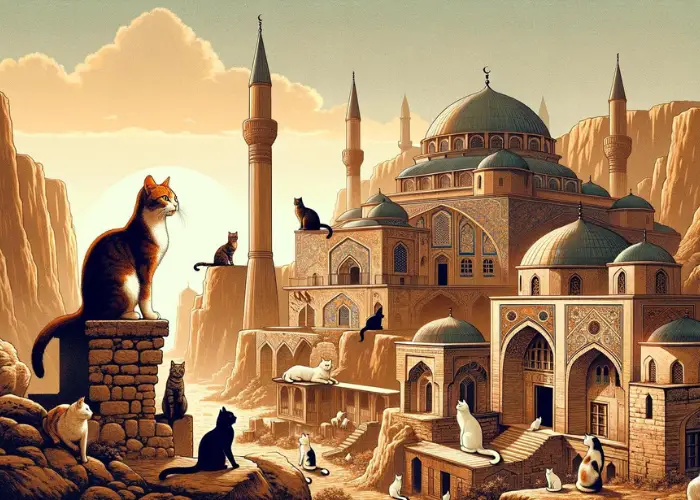
Cats in Islamic History
The history of cats within Islamic civilization is as rich as it is fascinating. From the courtyards of the Umayyad Mosque in Damascus to the streets of Istanbul, cats have been an integral part of Muslim societies.
Historical accounts and folklore often depict cats in positions of respect and admiration, highlighting their role in protecting precious books from library pests or being the companions of scholars and mystics.
This historical reverence aligns with the Islamic ethos of kindness towards all creatures.
Cats in Modern Muslim-majority Societies
Today, the legacy of cats in Islamic culture continues to thrive. Cats are a common sight in cities like Cairo or Marrakech, roaming freely and cared for by the community.
This collective care stems from the Prophetic teachings that encourage kindness towards cats and all living beings.
Modern Muslim-majority societies continue to embrace cats, not just as pets but as a part of the community’s fabric, embodying the Islamic principles of mercy and compassion.
Ethical Treatment and Animal Welfare in Islam
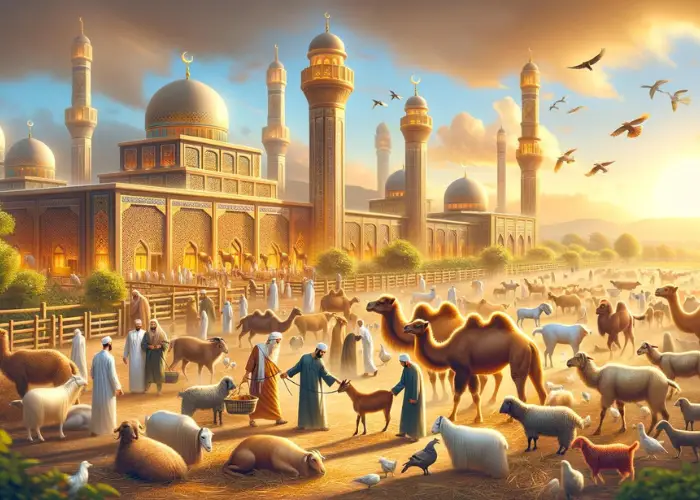
Rights of Animals in Islam
Islam’s emphasis on animal rights is profound, advocating for humane treatment and fulfilling their needs.
The Prophet Muhammad (PBUH) spoke against cruelty towards animals and emphasized their rights to food, water, and shelter.
This ethical framework extends to cats, mandating that they are not to be harmed, neglected, or treated with anything but kindness.
Caring for Cats: An Islamic Perspective
Caring for cats goes beyond providing food and shelter; it encompasses a holistic approach that considers their well-being and instincts.
Cats should be allowed the freedom to explore and express their natural behaviors. Regular veterinary care, proper nutrition, and a safe living environment are all part of responsible cat ownership in Islam.
This responsibility is not taken lightly, as neglecting these duties can lead to spiritual and moral accountability.
Practical Guidelines for Muslim Cat Owners
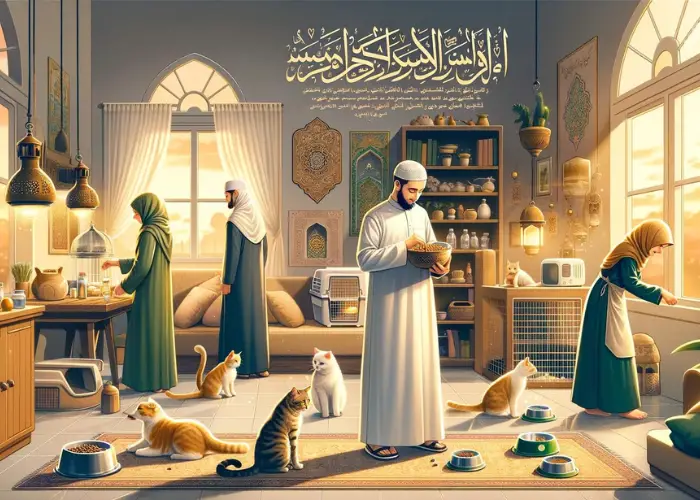
Keeping Cats in a Muslim Household
Incorporating a cat into a Muslim home involves more than just providing shelter; it’s about integrating them into your daily life while adhering to Islamic principles of cleanliness and respect.
It’s important to ensure that areas used for prayer are kept clean, even though cats are considered pure animals in Islam.
Practical steps like having a dedicated space for the cat to eat and sleep can help maintain the cleanliness of the prayer area.
Health and Hygiene
Maintaining the health and hygiene of your cat is not just a responsibility but a form of worship, as it aligns with the Islamic duty of caring for all living beings.
Regular grooming, vaccinations, and veterinary check-ups are essential.
Additionally, dealing with cat hair requires diligence, especially in areas used for prayer, to ensure they remain clean and free from impurities.
Feeding and Nutrition
Feeding your cat involves ensuring that the food is halal and nutritious. While cats are carnivores, providing them with a balanced diet that meets all their nutritional needs is essential.
Fresh water should always be available, reflecting the Prophet Muhammad’s (PBUH) kindness in allowing a cat to drink from his water.
Scholarly Interpretations and Diverse Opinions
Different Schools of Thought
Islamic jurisprudence, or Fiqh, offers a spectrum of opinions regarding pets. While all schools agree on the permissibility of keeping cats, nuances exist regarding their treatment, interaction, and care.
Exploring these perspectives can provide valuable insights and help cat owners navigate their responsibilities more effectively.
Contemporary Issues and Scholarly Debate
Modern issues such as spaying/neutering, adopting stray cats, and indoor vs. outdoor cats spark diverse opinions among scholars.
For example, neutering is generally accepted if it’s in the cat’s best interest or to prevent harm, reflecting the Islamic principle of preventing harm.
The Social and Emotional Benefits of Cats
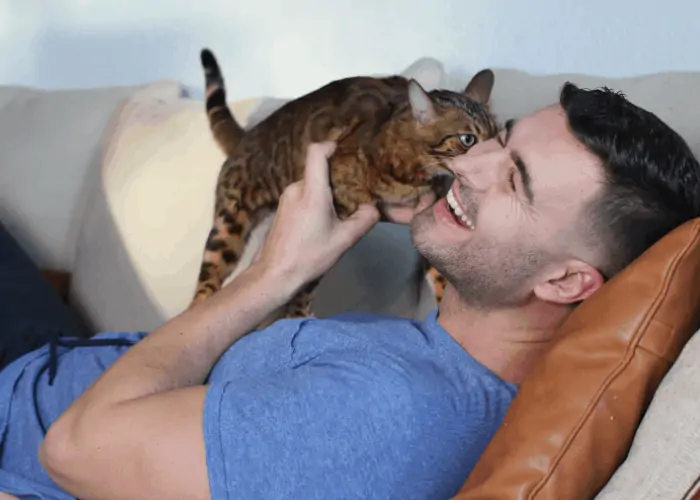
Cats and Mental Health
Cats are known for their therapeutic presence, offering companionship that can significantly reduce stress and improve overall mental health.
Their serene demeanor and affectionate nature make them excellent companions, particularly in the fast-paced modern world, aligning with Islamic teachings that recognize the healing power of kindness and companionship.
Cats as Companions in Islam
The companionship between Muslims and cats, highlighted by the Prophet Muhammad’s (PBUH) relationship with his cat Muezza, showcases the deep emotional bond that can develop.
This relationship benefits the individuals and adds a layer of compassion and empathy to the household, reflecting the broader Islamic values of mercy and care.
The Cat Fancier Community within Islam
Celebrating Cats in the Muslim World
The love for cats transcends individual households, with entire communities and events dedicated to celebrating these creatures.
From cat shows in Muslim-majority countries to online forums and social media groups, the cat fancier community within Islam is a testament to the enduring love and respect for these animals.
Prominent Muslim Figures and Their Cats
Throughout Islamic history, many prominent figures, scholars, and leaders have been known for their fondness for cats.
Their stories and anecdotes inspire and remind us of the joy and tranquility that cats can bring into our lives.
FAQs and Practical Advice
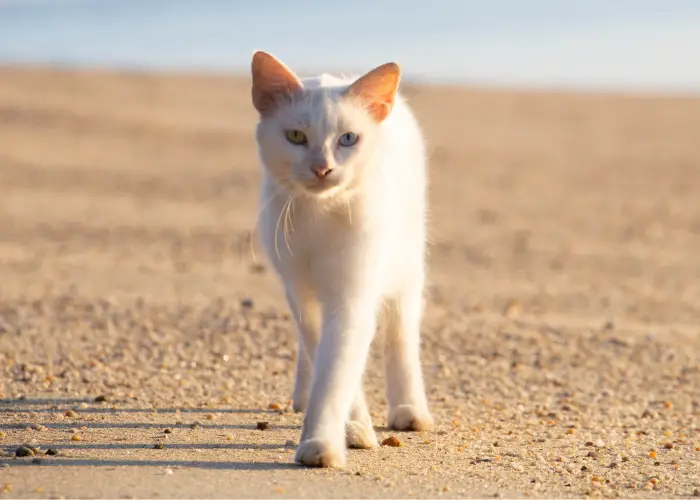
Common Questions Answered
Is it Haram to neuter a cat?
Neutering a cat is not considered haram in Islam if it is done to prevent harm or nuisance and does not harm the animal. Islamic scholars have various opinions, but the consensus leans towards permissibility under certain conditions, mainly to prevent unwanted litter.
Can I kiss my cat in Islam?
Islam does not explicitly forbid showing affection to pets, including cats. Cats are considered clean animals in Islam, and Hadiths show the Prophet Muhammad’s kindness towards them. However, personal hygiene and cleanliness should always be maintained.
Did the Prophet Muhammad have a cat?
Yes, the Prophet Muhammad reportedly had a cat named Muezza. He showed great kindness to Muezza, even cutting off a piece of his garment once to avoid disturbing the sleeping cat.
Which pets are allowed in Islam?
Islam allows keeping animals that do not cause harm or impurity. Cats are specifically mentioned and favored in Hadiths for their cleanliness and companionship. Other pets, like certain birds and fish, are also permissible, provided their care does not lead to neglect of religious duties.
Is it halal to buy a cat?
Buying and selling cats is generally permissible in Islam, provided the transaction does not harm or neglect the animal. The emphasis is always on the welfare and ethical treatment of the animal in line with Islamic principles of compassion and care.
Tips for Prospective and Current Muslim Cat Owners
Practical tips for those looking to adopt a cat or those already owning one could include advice on choosing the right cat, understanding cat behavior, and ensuring their needs are met in a way that aligns with Islamic teachings.
Conclusion
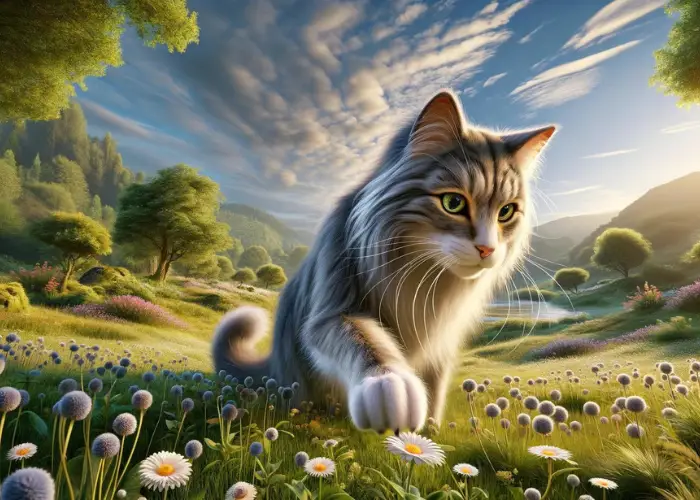
In conclusion, the inquiry into whether cats are haram in Islam reveals a profound respect and affection for these animals within the faith.
Far from being forbidden, cats are regarded with kindness and compassion, reflecting the teachings and practices rooted in Islamic tradition.
This exploration sheds light on the Islamic stance on cats and underscores the broader values of mercy and care for all creatures in the Muslim community.

